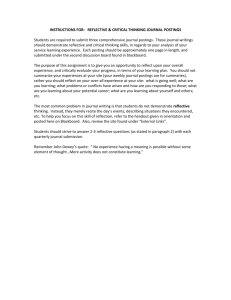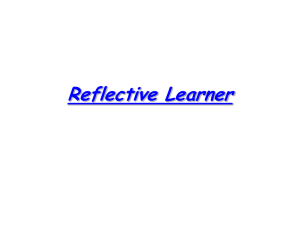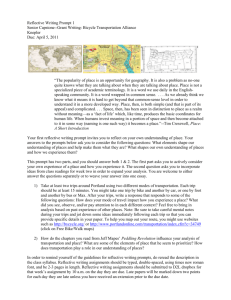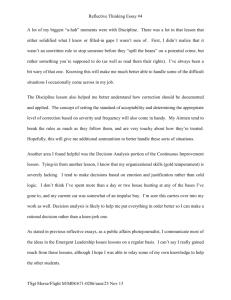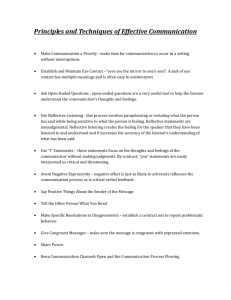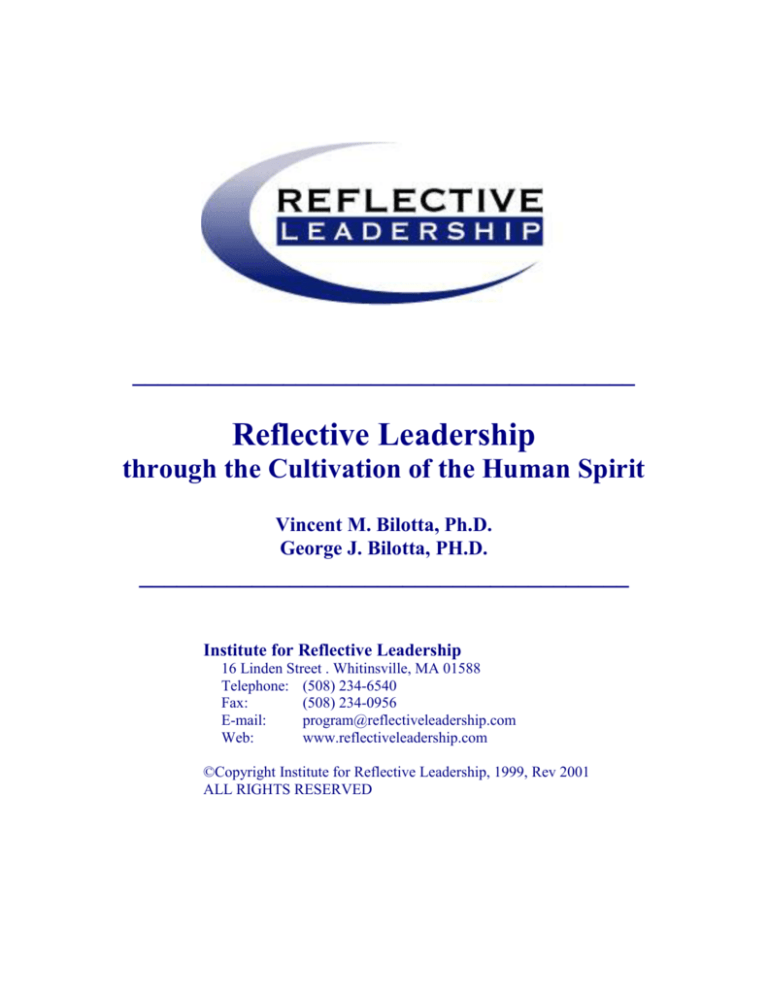
________________________________________
Reflective Leadership
through the Cultivation of the Human Spirit
Vincent M. Bilotta, Ph.D.
George J. Bilotta, PH.D.
_______________________________________
Institute for Reflective Leadership
16 Linden Street . Whitinsville, MA 01588
Telephone: (508) 234-6540
Fax:
(508) 234-0956
E-mail:
program@reflectiveleadership.com
Web:
www.reflectiveleadership.com
©Copyright Institute for Reflective Leadership, 1999, Rev 2001
ALL RIGHTS RESERVED
Reflective Leadership
through the Cultivation of the Human Spirit
Vincent M. Bilotta, Ph.D.
George J. Bilotta, PH.D.
Leadership flows out of one's spirit. A cultivated spirit, as well as a neglected
spirit, directly influences the style and the manner by which one leads. Reflective
Leadership draws deeply from a spirit that continues to be cultivated intentionally,
purposefully and gently. Unfolding not only from a leader's willingness and capacity to
nurture the spirit dimension of self, Reflective Leadership also entails a paradigmatic
shift from a functional to a dynamic leadership perspective.
Reflective leaders have transitioned from a leadership style that was formed by their
functional values to a leadership style inspired by spirit values. While the functional
dimension is valued and necessary, it needs to be in the service of the spirit dimension.
Leadership that draws primary from a functional perspective relies disproportionately on
the ego. The ego tends to distort and hinder the ability to foster eyes to see, ears to hear
and a heart to feel the people, events and things that compose life and work. Reflective
leaders welcome functional values but transform them in ways that serve the spirit
dimension. In so doing they open their eyes, ears and hearts to experience the wonder of
life. They engage more wholeheartedly in the mystery of creativity and embrace the
hidden meaning and joy of work and productivity.
Reflective Leadership is about living and leading primarily through a spirit
perspective and secondarily through the functional perspective. Having grown in
appreciation of their experience, reflective leaders live out of an appreciative perspective
and bring this unique disposition to the organization, to the family, to the people, events
and things of the world. Reflective leaders appreciate that though the latest functional
leadership views and techniques are both important and helpful, authentic leadership
flows from Reflective Living, a life style and work style that cultivates and nurtures the
spirit seamlessly and effortlessly.
Benefits of Reflective Leadership
There are both tangible and intangible benefits of this leadership model. Reflective
Leadership assists all to understand and to be in the service of the bigger picture, the
transcendent horizon. Authentic corporate and organizational transformation transpires
primarily through the personal metamorphosis of its leadership on all levels within the
organization. It begins from the top down, from the president of the board and executive
________________________________________________________________________________________________
Reflective Leadership through the Cultivation of the Human Spirit Page -1Institute for Reflective Leadership Web: www.reflectiveleadership.com E-mail: program@reflectiveleadership.com
©Copyright Institute for Reflective Leadership,1999, rev. 2001 ALL RIGHTS RESERVED
team, to managers and supervisors, and continues through teams and individual members.
Secondarily, corporate and organizational transformation comes about by acquiring the
necessary functional skills, techniques and methods that the work requires. While
techniques and skills are in and of themselves good, they need to serve something higher.
The initial benefits begin within the individual. Tangibly, there is a decrease in body
tension and stress. Leaders report that they experience fewer headaches, digestive and
intestinal problems, less skin disorders and less illness in general. Overall they feel more
relaxed. They experience an aliveness, a flourishing and clarity. Emotionally, they
register less fear, anxiety, burnout and internal pressure. Interpersonally, family life and
relationships seem more connected, happier and satisfying. At work, communication with
people seems easier, responsive and clearer. Leaders feel less alone and isolated in their
work and at home.
Intangibly, there is a sense of increased self-confidence, equanimity and inner peace
even though there are many people requiring their attention and projects needing
completion. Though results and performance remain essential, leaders feel less urgency,
less need to bear down and push. Long term needs are not sacrificed for the short term
goal. From a spirit perspective fulfillment, trust and appreciation seem to breathe anew.
There is increased meaning for the work being done along with understanding the
connection to the bigger picture also comes together. There is vitality and creativity.
Within the organization, tangible benefits include increased productivity,
thoroughness, less territoriality and backstabbing between individuals, teams and
departments. There is a measurable increase in cooperation, a noticeable decrease in an
individual's need to be right, to be competitive. With a focus on the project rather than on
personal ego attachment, communication seems less defensive and more productive.
Efficiency, effectiveness, productivity and profitability increases are obvious.
Intangible benefits within the organization include clarity of priorities, goodwill,
renewed dedication and loyalty. A sense of belonging and humane interactions pervades
the workplace. Excessive discouragement, disillusionment and cynicism decreases.
Team spirit, inspiration, creativity, innovation, problem solving, empowerment,
resilience, focus and responsiveness are all hallmarks of an organization led by reflective
leaders. Clearly, the individual spirit is the true source of business revitalization and
success.
Within the organization people feel supported by values such as justice, respect,
equality, fairness, dignity, participation, ethics, integrity, honesty, diversity and
accountability. Communication is characterized by the qualities of openness, receptivity
and connectedness. People feel safe to speak the truth, feel listened to, heard and
understood. Work styles are more collaborative, cooperative and adaptive. Now more at
ease, worker efficiency increases, as employees work smarter and not harder.
________________________________________________________________________________________________
Reflective Leadership through the Cultivation of the Human Spirit Page -2Institute for Reflective Leadership Web: www.reflectiveleadership.com E-mail: program@reflectiveleadership.com
©Copyright Institute for Reflective Leadership,1999, rev. 2001 ALL RIGHTS RESERVED
Leadership Perspective
Leadership encompasses a diversity of practices, definitions, opinions and
philosophies. Within the business world alone, some 150 different adjectives try to define
and specify the details and nuances of leadership. Books, articles, trainings, mentoring
and the daily common practice of leadership disclose that today's prevailing and preferred
leadership models operate out of a functional perspective that emphasizes doing,
managing and accomplishing. To soften and humanize functional models, leaders have
incorporated interpersonal skills, but most of these tend to be also functional in nature.
Consequently, they often come across more as a veneer of humanity rather than deeply
rooted dispositions within the core and heart of the leader. Alternatively, Reflective
Leadership proposes to cultivate eyes to see, ears to hear, and a heart to feel in a model
that is rooted deeply within a leader's cultivated spirit.
Both the functional leadership model and the Reflective Leadership model advance
a particular perspective, a frame of reference with each proceeding from its own
anthropology. To illustrate this point, let's take a walk in the forest with a few people.
One member of the group is a businessperson, a lumberjack by trade. He sees a 50-yearold tree with dollar signs in his eyes. A second companion is a botanist. Gazing at the
same tree, she proclaims its Latin name, discourses with a historical understanding on the
species, and offers an abundance of scientific information. The other members of the
group are a high school couple. They look at the tree as a romantic backdrop as they
embrace and kiss, eventually carving their initials within a heart into the tree. In this one
example, three different perspectives unfold. All are correct. They just lead to different
thoughts and consequent behaviors.
Leadership is a perspective, a particular way of approaching work. Leaders bring to
their work the totality of who they are. They do not turn themselves on and off, though
many try. Most people in leadership positions remain unaware, disinterested and
ignorant of their perspective and approach to leadership. As long as the job is
accomplished and everyone involved is happy, they are content.
Whether discussing the leadership styles and objectives of a parent, coach,
politician, foreman, manager, executive, teacher, office assistant, cleric or military
captain, the basics of functional leadership seem to rely on appropriating new and
improved leadership skills. Functional leaders emerge through their egos rather than
through their spirits. Ego values encompass mastering, managing, analyzing, using,
doing, conquering, accomplishing, succeeding, achieving, or winning. The functional
approach is rigorously analytic and tends to pull apart and isolate the various segments.
In doing so, it misses the bigger picture, the interdependence and the interconnectedness
of the many parts of the whole picture.
On the other hand, spirit values embrace cooperation, receptivity, flexibility,
appreciation, care, compassion, adaptability, courtesy, focus, simplicity and creativity.
Reflective leaders immerse themselves in a particular style and way of living, Reflective
Living. Society has drifted away and forgotten the pivotal importance of what it means to
________________________________________________________________________________________________
Reflective Leadership through the Cultivation of the Human Spirit Page -3Institute for Reflective Leadership Web: www.reflectiveleadership.com E-mail: program@reflectiveleadership.com
©Copyright Institute for Reflective Leadership,1999, rev. 2001 ALL RIGHTS RESERVED
be a reflective human being, dedicated to the art of Reflective Living. Simply, Reflective
Living is an ongoing gentle cultivation of one's unique human spirit. It fosters eyes to see,
ears to hear and a heart to feel the wonder of life, the creativity of productivity.
Functional Leadership
Functional leadership flows from functional thinking a compartmentalizing with
a primary emphasis on doing, managing, controlling and accomplishing which tends to
close off the self. Functional thinking pushes with a focus on getting the job done,
getting the project off the ground. Functional thinking specializes in managing life
practically, effectively and efficiently. It encourages an attitude of being on top and in
control. It also breeds compulsiveness, rigidity, perfectionism, stubbornness, willfulness,
competition and aggressiveness.
The functional frame of reference includes a certain dehumanizing, almost robotlike quality. Due to the preoccupation with doing, achieving, accomplishing and
managing, the body is isolated and the spirit is severed from the self. The echo of how to
work more effectively, more efficiently is a constant refrain. Within an exclusive
functional orientation, the excessive "shoulds" of functional performance may sacrifice
health and physical vigor, creativity and teamwork to the relentless pursuit of status,
power, possession and achievement. Nutrition, rest, relaxation, re-creative exercise tend
to recede into the background.
For the functionalist, he understands who he is through doing, working and
achieving, devoid of spirit, soul, heart. Alienated from one's spirit potency, the
functional leader manages rather than inspires, produces rather than creates, controls
rather than liberates the team, the staff, the organization, the workplace.
Functional leadership is not bad; it just yearns and aspires for something more. If
detached from one's energizing core, the functional leader may succeed in accomplishing
the task at hand, yet fail at cultivating and fostering the bigger picture, the vision and
mission of the organization. Spirit based leadership seems to more authentically motivate
and open organization members and employees to the tasks at hand with renewed vigor
and creativity. As the 21st century dawns, most writers, trainers and practitioners of
leadership unfortunately herald the functional leadership approach as the model to follow.
History of the Functional Approach
Our culture has evolved from and has deep historical roots in the soil of
functionalism, utilitarianism and pragmatism. Meaning and purpose seem to possess
value only in reference to the "how." How people function as parents, executives,
coaches, etc. seems what is most significant to people.
A significantly different worldview permeated everyday life prior to the
Enlightenment period of the 17th and 18th centuries, and even more extensively prior to
________________________________________________________________________________________________
Reflective Leadership through the Cultivation of the Human Spirit Page -4Institute for Reflective Leadership Web: www.reflectiveleadership.com E-mail: program@reflectiveleadership.com
©Copyright Institute for Reflective Leadership,1999, rev. 2001 ALL RIGHTS RESERVED
the Renaissance period of the 14th through 17th centuries. The world was full of mystery
and transcendence. People responded with awe and mystery, with respect and
appreciation. They woke up in the morning and were filled with awe. They went to sleep
in the evening thankful for another day. Meaning, purpose and identity were understood
within relationships, and within relationship to people, society and God. They
experienced a unity, wholeness and interconnectedness among people, events and things
in the world. They possessed a frame of reference to understand their place and role
within the universe.
The Enlightenment period witnessed a shift in focus from transcendence and
mystery to humankind in general and then later to the individual person. The human ego,
the "I", became highly accented and elevated, as did striving for efficiency and
effectivity. The human spirit increasingly was covered over, taken for granted, repressed
and de-emphasized. As science and technology increased, interest in spirituality
decreased. The 19th century witnessed a preponderant focus on the self through selfreliance, self-sufficiency, self-sustaining, self-determining, self-containing, self-made.
The 20th century likewise became obsessed with fostering hard work, selfdetermination, self-interest and the indulgence in the needs of the self. Western culture
evolved into a culture of doing one's own thing, plagued with self-improvement, selfrealization and self-actualization. Consequently, people in general have become insulated
and closed off from their unique human spirit. There seems to be a lack of meaning, focus
and direction as people often find themselves standing alone complaining of
disconnectedness and estrangement, feeling empty, bored and depressed.
To a significant extent our societal institutions seem to disregard the transcendent,
the mystery, the sacred, the heart, and the spirit. As a consequence, most people feel out
of touch with the bigger picture, the broader horizon of life. Today our culture overflows
with narcissism, a focus on the external rather than the internal, on the "me" rather than
the
"we", on the narrow immediacy of now rather than the larger picture of life's totality. As
a result people pursue status, income, authority and power. We invest ourselves in fads.
We dye our hair and make-up our faces. We go to the gym to look good and buy the
latest gadgets to distract and entertain ourselves. We seek the spectacular, the dramatic,
the sensational.
Our culture continues to teach us to function, and we function very well, thank-you.
If the truth were told however, most people are bored silly, exhausted and yearning for
depth and meaning, direction and "the more than" that is missing from their lives.
Reflective Thinking
In searching for more, we begin with Reflective Thinking. First and foremost, it is a
heightened consciousness, a dwelling experience with meditative rather than analytic
characteristics. Dwelling with the phenomena permits the disclosure of its truth.
________________________________________________________________________________________________
Reflective Leadership through the Cultivation of the Human Spirit Page -5Institute for Reflective Leadership Web: www.reflectiveleadership.com E-mail: program@reflectiveleadership.com
©Copyright Institute for Reflective Leadership,1999, rev. 2001 ALL RIGHTS RESERVED
Second, Reflective Thinking is being awake and aware to experience. It is being in
touch with reality in a wide-awake manner, being aware of the people, events and things
within one's domain of reference, seeing, hearing, and internalizing all that is around
them. While focusing, attending and dwelling with the experience, the disclosure and
meaning, the teaching and wisdom of what is transpiring around and within self comes
forth. In this manner one moves beyond a state of taking-for-granted.
Third, Reflective Thinking is an invitation to grow into mystery, into a sense of the
sacred. In addition, Reflective Thinking fosters specific disciplines and dispositions of
the heart, e.g., openness, receptivity, awe, and appreciation. Reflective Thinking is in the
service of cultivating the human spirit rather than the utilitarian gathering of facts for
analysis.
Through dwelling and being awake, we tend to see, hear and feel the meaning and
wisdom disclosed in the people, events and things that surround us. This encourages and
supports us to cultivate dispositions of the heart. Such cultivation deepens our dwelling,
deepens our state of being wide-awake and attentive. The outcome of Reflective
Thinking is an increased appreciation of the disclosed wisdom and mystery that arises
from the people, events and things that shape and form us personally, professionally and
corporately.
Reflective Living
Once people are reflective in their thinking, the next step is Reflective Living.
Precisely the manner by which we function in the everydayness of our world is in part the
difference between being functional and being reflective. Reflective Living flows out of a
particular manner and way of choosing to take up the everyday experiences of home and
family, work and productivity, community and teamwork.
The art of Reflective Living opposes the functional, utilitarian and practical styles of
taking for granted most of daily life's experiences. Reflective Living is being aware of
how people, events and things are forming and shaping our lives in both a formative
(positive) and deformative (negative) manner. Reflective Living is being awake to the
dynamics, facilitating conditions and ingrained obstacles that cultivate or erode our
unique human spirit. It is an intentional way of living.
Reflective Living acknowledges in an ongoing ordinary everyday manner the sacred
dimension, the mystery of life and the universe of which we are an integral part. It is an
ongoing acknowledgment, then a seeking of that which is missing, that which infuses
meaning. The outcome of Reflective Living includes well-being, connection with the
mystery, the sacred, the transcendent through people, events and things. Reflective
Living leads to a better life, an appreciative and gracious life, a consonant and
harmonious life both personally and professionally.
________________________________________________________________________________________________
Reflective Leadership through the Cultivation of the Human Spirit Page -6Institute for Reflective Leadership Web: www.reflectiveleadership.com E-mail: program@reflectiveleadership.com
©Copyright Institute for Reflective Leadership,1999, rev. 2001 ALL RIGHTS RESERVED
Reflective Living hinges on remembering. Within the process of remembering,
anything and everything can be placed in perspective against the backdrop of the big
picture, against the frame of reference out of which meaning forms. To cultivate constant
remembering is to faithfully maintain the larger context, the wider horizon. Constant
faithful remembering points to what praying "ceaselessly" and what praying "always" is
about. It is remembering in the here and now as one directs, coaches, parents, manages,
supervises, or produces, the presence of God, or the interconnectedness of the world, or
the harmonizing energy of the universe. Within this framework, peace, balance, and inner
quiet may be experienced.
Weekend gardeners who approach their front yard on Saturday morning with the
motivation to impress the neighbors tend to experience their gardening as a task, burden
and drudgery. These gardeners are in some type of competition with themselves or with
the hidden other. Possessing the knowledge of plants and tools, they function technically.
They produce impressive results for the neighbors to ooh and ah. Though the gardening
experience feels satisfying on the ego level, "look at what I have accomplished," the
gardener's spirit remains unnourished, unaffected.
Alternatively, other weekend gardeners approach the garden as an opportunity to
play in the ground of mother earth, to smell the flowers and grass cuttings, to feel the sun,
the breeze, to experience beauty. These gardeners have not only cultivated their front
yards but have also cultivated their human spirit. Though tired from their labor, they
retire inside their home invigorated, grounded and integrated.
Reflective Leadership
Within the cultivated internal environment of Reflective Living, a reflective leader
fully, harmoniously, and faithfully gives over to the task at hand, the activity underway,
or the project unfolding. Technical, practical and functional skills converge in the service
of the deeper meaning, the wider horizon. Synergy results. There is greater focus,
enhanced creativity, effortless work and increased productivity. We function well
because we are in the service of the bigger picture. In the moment life has meaning,
purpose, focus and perspective.
Reflective Leadership roots deeply within the fertile soil of Reflective Living, as
opposed to the practical acquisition of analytical and functional leadership skills.
Methodologically, both Reflective Thinking and Reflective Leadership are grounded in
the art of Reflective Living.
The reflective leader creates motivation, positive attitudes, commitment to
teamwork, competence, productivity, as well as the ability to rethink what one is doing
and how one is doing it. He is mindful, receptive, focused and self-disciplined.
Clem, a Boy Scout troop master, was a reflective leader. He saw the bigger picture.
An ordinary man in his fifties, he had extraordinary vision concerning young men under
________________________________________________________________________________________________
Reflective Leadership through the Cultivation of the Human Spirit Page -7Institute for Reflective Leadership Web: www.reflectiveleadership.com E-mail: program@reflectiveleadership.com
©Copyright Institute for Reflective Leadership,1999, rev. 2001 ALL RIGHTS RESERVED
his tutelage. There was a kindness about him. He radiated a welcoming, gentle and
understanding style. He knew how to lead, direct, teach and instill confidence. Clem's
leadership perspective flowed from who he was, from his way of living. His way of
living was consistent whether with his family, at work, or volunteering. He led with heart,
with spirit. He walked gently and invited people to be with him.
Gail is another example of a reflective leader. Gail is the local branch manager at a
state-wide bank. She has many younger employees under her care and understands that
many will move on in a few years. For Gail, the bigger picture is insuring a positive
experience and instilling values of teamwork, competence and creativity within her
employees. She has found giving her employees the best of who she is as a leader,
cheerleader, motivator, advisor, problem solver, father, mother, teacher, and mentor
insures the best customer service. She believes in respect, patience and gratefulness. She
has a program of having breakfast with a different employee twice a week at a
neighborhood cafe around the corner from the bank.
Cultivating Our Unique Human Spirit
Our human spirit is cultivated through Reflective Living. Through reflection we tune
into our everyday human experience. Everyday experience is the text and the guide that
discloses our unique spirit direction. Becoming more in touch with our lived experience
expands our consciousness by slowing down, stopping, stepping aside, disengaging,
retreating. When we participate in spirit-filled disciplines to expand our consciousness,
we feel grounded, centered, focused, rooted and connected. This empowers us to be open,
receptive and vulnerable. In this manner, we enable our human experience our sacred
text and guide to speak, to disclose its lived teaching, meaning and wisdom.
Expanding our consciousness, participating in Reflective Living, and disclosing our
human experience text, also depends on our habits of noticing. We do not experience
what we do not notice. Most people only notice the spectacular, the dramatic, the
sensational. Television commercials exercise extraordinary efforts to capture our
attention, to get us to notice. We automatically filter much of our daily experience.
Therefore, we need to take charge and to notice by having the intention to notice more.
By committing ourselves to unfolding our day in a reflective manner, through Reflective
Living, much of life will cease being taken for granted, without notice, without
appreciation, without perspective.
Focused pausing enhances the art of Reflective Living and the cultivation of the
human spirit. Pausing, as the primordial stuff of a spirit-filling discipline and practice, is
not about tasking, scheduling or accomplishing. Rather, the usual and ordinary rhythm of
pausing implies more of an attitude or approach toward life. Pausing simply invites
wonder, awe, feeling and reflection to unfold during our day, to become more a part of a
reflective life.
________________________________________________________________________________________________
Reflective Leadership through the Cultivation of the Human Spirit Page -8Institute for Reflective Leadership Web: www.reflectiveleadership.com E-mail: program@reflectiveleadership.com
©Copyright Institute for Reflective Leadership,1999, rev. 2001 ALL RIGHTS RESERVED
Functionally, our lives are geared toward action, not pausing. Initially everything
around us will resist our attempt to change this equilibrium. Many of us could genuinely
express that we value pausing at least in a conceptual way. Pausing during the day makes
sense. We probably would agree that increased pausing during our day would cultivate
something special within our lives. Most of us however, do not reside within monastic
communities with its rhythm of structured pauses. Learning to pause is not intrinsically
difficult. We actually pause numerous times during the day. Turning an ordinary pause
into a Reflective Living practice however, is a rather different matter.
Fostering and integrating pausing is not a task. If we associate pausing in any way
with work, productivity, performance or achievement then pausing will simply not evolve
into a Reflective Living practice cultivating our spirit. Pausing resembles more a mode of
breathing. Have you ever noticed that we tend to breathe deeply when we close our eyes
and focus on our breathing? No one taught us how to breathe deeply. When we close our
eyes and focus on our breathing we just naturally seem to breathe deeply. We feel relaxed
as a result.
In this manner pausing seems similar to breathing. We know how to pause. We
pause hundreds of times a day. Pausing deeply or pausing as preparation for a Reflective
Living practice transpires when we actually or figuratively close our eyes and pausewith-focus. Transforming pausing into a Reflective Living practice is not so much the
pause itself, as the focus while pausing.
While standing in line at the grocery checkout counter for example, we have paused
from the chore of shopping. We pause, waiting for our turn with the clerk. This common
experience discloses itself as an ordinary pause during a busy, maybe even a hectic day.
While pausing we may occupy our time by glancing at the magazines, tabloids, the candy
bars, gum, or breath mints that line either side of the checkout aisle. What transforms this
ordinary aimless pause into an opportunity for a Reflective Living practice? Choice and
focus can transform the pause into a momentary refreshing, spirit nurturing practice.
We have a choice. We can continue to browse the materials along the checkout
counter or we can pause-with-focus. For example we might pause-with-focus on the
notion of gratitude. Dwelling for a moment on the people and circumstances in our lives
that bring about thankfulness and appreciation advances a nurturing spiritual practice. We
may become aware of another shopper who appears handicapped or physically
challenged in some manner. This may lead to dwelling in gratitude that we have the
healthy use of our body. We allow ourselves to be filled with appreciation. We
acknowledge and dwell in gratitude that we can go about daily life unencumbered by
crutches, a wheelchair, or braces. We can wash and dress without assistance. We feel
blessed.
Thirty seconds of pausing-with-focus has reoriented and refreshed our interaction
with the world. We have slowed and reflected. We have noticed and appreciated. Part of
life has been placed into perspective. In a spirit of gratitude we move on to the next task
________________________________________________________________________________________________
Reflective Leadership through the Cultivation of the Human Spirit Page -9Institute for Reflective Leadership Web: www.reflectiveleadership.com E-mail: program@reflectiveleadership.com
©Copyright Institute for Reflective Leadership,1999, rev. 2001 ALL RIGHTS RESERVED
of the day. Our spirit having been nurtured, we proceed with the day with a renewed
gracious disposition toward self, others and life's situations.
Though this spirit of gratitude may only last for a minute, imagine the effect on our
lives if our days were filled with numerous brief pauses-with-focus. These simple and
ordinary Reflective Living pauses eventually will have a wonderful accumulative result
within our everyday lives. Imagine transforming 10 pauses a day into reflections of
gratitude. With 70 moments of gratitude a week that is about 250 moments of
gratitude a month without a doubt this accumulation of gratitude would have a
penetrating influence on how we journey through our day and life. It would provide and
disclose a different orientation and meaning to the day. It would contribute to energizing
our spirit.
For example, in commuting to work, one may choose to listen to distracting music
or chatter, or one may choose to be reflective, to focus, to be awake and aware of the
surroundings, the people, events and things of one's immediate environment. It possesses
the potential to be a spirit-filled reflective experience or a spirit-depleting functional
experience.
Marilyn commutes by car. Even before turning the ignition, she feels rushed. Her
body tenses and she anticipates the hassle of traffic. She starts the car, the radio goes on
and she begins to think about the tasks to be accomplished at work. At the first set of
traffic lights, the internal exasperated dialogue begins and she feels pushed by the traffic
flow, wound-up and agitated. Commuting to work for Marilyn was a de-spiriting
experience, and this was an easy commute day.
Nancy also commutes by car. However, Nancy chooses to interpret her commute as
an opportunity. She accepts that commuting is a hassle. Surrendering to the reality of the
morning commute, she tries to make the best of the situation. She starts the car,
intentionally keeping the radio turned off. She begins to focus on her theme for the week,
"appreciation." At the first set of traffic lights she notes the unusual amount of traffic at
that early hour. She notices a couple seemingly fighting in their car. She feels thankful
that she and her husband rarely fight. Her internal conversation relates that she feels
grateful for having him in her life. They make a good couple and team together.
A couple of more stops and Nancy begins to laugh a little, "why is this guy in such a
hurry, he's not going to get there any faster in this traffic." Nancy begins to wonder about
the elderly man taking his morning walk on the other side of the street. What is his life
about? Later she chuckles to herself for getting aggressive with her driving having gotten
caught-up in the hurried traffic flow. She arrives at work composed, reflective,
appreciative, and with a positive attitude about her life and her coming day.
Remembering the bigger picture of life, bringing perspective to her life, permitted Nancy
to have a spirit-filled commute. She used her commute time to reflect on her life.
________________________________________________________________________________________________
Reflective Leadership through the Cultivation of the Human Spirit Page -10Institute for Reflective Leadership Web: www.reflectiveleadership.com E-mail: program@reflectiveleadership.com
©Copyright Institute for Reflective Leadership,1999, rev. 2001 ALL RIGHTS RESERVED
Dan, a bio-genetics researcher often feels overwhelmed with government grant
paperwork. He prefers spending all his time on research. Since Dan also possesses
business acumen and can cope with the paperwork better than anyone else, his
department has selected him as the government liaison and controller. He accepts the fact
that within this team effort he is the best person to deal with the non-research issues. Well
aware that the team is doing some phenomenal research, he feels blessed having the
opportunity to work with such an outstanding group of people. He acknowledges that the
team depends on him for that something extra that he offers. He tries to live out of the
bigger picture concerning what the team is all about.
The Pilgrim and the Tourist
As practitioners of the art of Reflective Living, we might inquire: am I a tourist or a
pilgrim? A tourist travels for pleasure generally trekking from site to site, checking the
site off the must-see-list and moving on. On the other hand a pilgrim proceeds in a
reverential reflective fashion seeking the sacred. If a tourist is a functional collector of
sites, activities and memories, then a pilgrim is a detached explorer searching for the
mystery, the sacred and the transcendent.
The tourist hurries about, cramming in as much as possible, skimming the surface.
The pilgrim lingers and dwells, open and receptive, constantly in a reflective mode,
seeking the mystery within. Tourists are often exhausted after their tour, whereas the
pilgrim is more likely to be energized and spirit-filled following the day's pilgrimage.
Reflective Leadership is not a tour of the latest motivational fads, analytical skills,
communication techniques and functional tools to get the job accomplished efficiently,
effectively and qualitatively. Instead, like a pilgrim, a reflective leader dwells within an
interior journey quietly and patiently waiting for the experience to disclosure the meaning
for the people, events and things within the leader's sphere of influence.
Ultimately, leaders of all kinds are called upon everyday to make a conscious choice
of following the functional model or the reflective model of leadership. Both are correct.
They just provide vastly different life experiences. Reflective Leadership brings a unique
perspective to the workplace and to the people, events and things of work. It is a softedged process within the hard-edged realities of work and business.
__________
We are deeply indebted to Adrian van Kaam, Ph.D., Epiphany Association,
Pittsburgh, PA, for his 60 years of developing the Science of Formative Spirituality.
Vincent M. Bilotta, Ph.D., is the founder and president of Formation
Consultation Services, Inc., the original founding company of the INSTITUTE FOR
REFLECTIVE LEADERSHIP. An internationally recognized consultant, he has developed
________________________________________________________________________________________________
Reflective Leadership through the Cultivation of the Human Spirit Page -11Institute for Reflective Leadership Web: www.reflectiveleadership.com E-mail: program@reflectiveleadership.com
©Copyright Institute for Reflective Leadership,1999, rev. 2001 ALL RIGHTS RESERVED
numerous formation programs over the past 30 plus years. Founder of the Sabbath Center
in Massachusetts, he is a much sought after speaker and author of many articles. Dr.
Vincent Bilotta can be contacted at INSTITUTE FOR REFLECTIVE LEADERSHIP, 16 Linden
Street, Whitinsville, MA 01588-2209, e-mail: program@reflectiveleadership.com,
phone: 508.234. 6540,
George J. Bilotta, Ph.D., consultant, is also co-founder of the INSTITUTE FOR
REFLECTIVE LEADERSHIP. With extensive academic history and practice in spirituality,
theology, psychology, sociology and pastoral care, he has worked academically,
clinically and practically with people and organizations concerning the cultivation of the
human spirit. Dr. George Bilotta can be contacted at 173 Malden Street, West Boylston,
MA 01583-1020, e-mail: program@reflectiveleadership.com , phone: 508.835.6054.
The original Reflective Leadership through the Cultivation of the Human Spirit article
was published in Bill Bergquist, et al. Executive Coaching: Resource Book 2000.
Sacramento, CA, Pacific Soundings Press, 1999, pages 273-286.
*****
________________________________________________________________________________________________
Reflective Leadership through the Cultivation of the Human Spirit Page -12Institute for Reflective Leadership Web: www.reflectiveleadership.com E-mail: program@reflectiveleadership.com
©Copyright Institute for Reflective Leadership,1999, rev. 2001 ALL RIGHTS RESERVED



